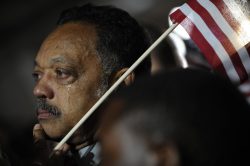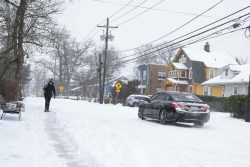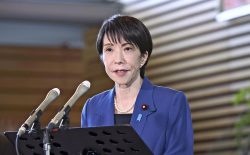
Family members who have been living in a van walk past St. Patrick’s Catholic Church on July 1.
15:17 JST, July 3, 2022
WASHINGTON – The children were hungry.
It was after noon on Friday, and they hadn’t yet had breakfast. They also didn’t know when, or if, they would get lunch.
And yet, none of them complained or cried. Not the 4-year-old in the pink baseball cap. Not the 6-year-old in the dinosaur top. Not the 11-year-old who wore winter boots on a 90-degree day. They seemed used to waiting.
“They shouldn’t be in this situation,” their father, Alberto, said in Spanish, looking in their direction. “They should be in a home, being taken care of, eating, resting, going to school.”
For the past year, the family of five has lived in the Washington region on the edges of edges. They are undocumented migrants, have serious medical issues and don’t have a home. The family has been living out of a van.
Some nights, they park their Honda Odyssey on a D.C. street. Other nights, they find a spot in Virginia. Where they end up each day usually depends on where they can find an undisturbed night and an easy drive to Alberto’s many medical appointments. He receives dialysis for his failing kidneys three times a week.
As he sat outside a church in Northwest D.C., he lifted his sleeve to expose large lumps on his right arm from the fistula that connects his body to the dialysis machine. He then lifted the rest of his shirt and revealed the bullet wounds that caused him to leave El Salvador with his family. He said he was shot six times by gang members because he wouldn’t cooperate with them. Scars appear above his heart, on his side and on his back. He said two bullets remain in him. Doctors have told him that the strong antibiotics he received after the shooting are likely what damaged his kidneys.
“I can’t work,” he said. “I can’t feel my left side. If I stand too long on my left foot, I fall.”
I learned about Alberto and his family from Food Justice DMV, a volunteer collective that formed at the beginning of the pandemic to make sure migrant families in the Washington region wouldn’t go hungry. Three years into the pandemic, much of the region has returned to its normal practices, but the collective continues to witness daily the elusiveness of stability for many of the area’s undocumented migrants.
Volunteers have seen a growing number of requests for help at a time when inflation is constraining how much they can do for families. On Thursday, for the first time, they could not afford to give more than 1,000 families oil or masa, staple ingredients for many Latino households.
Denise Woods, the founder of Food Justice DMV, said at the beginning of the pandemic, volunteers held the goal of serving 200 families. But they soon saw the need was much greater. Now volunteers serve more than 7,000 families. The collective hasn’t had to do any outreach to find those families. Those families have all found the volunteers through word of mouth.
While the collective focuses on addressing hunger, volunteers also get requests for toothpaste, laundry detergent and bars of soap. Recently, they delivered beds to an apartment after finding out that 12 people, including seven children, were living there and had nothing to sleep on.
Like many people across the nation, Woods watched with heartbreak the initial news reports that told of the deaths of 53 migrants who were trapped in a sweltering tractor-trailer abandoned on a San Antonio road. She also watched knowing that if any of those people had made it to the Washington region, her group would have fed them and provided them with basic comforts. She watched knowing that the horrors many migrants face continue long after they’ve crossed the border.
Food Justice DMV has been trying to help Alberto’s family for months, and while they’ve been able to provide groceries, clothing and funding for an occasional hotel room, they have not been able to get the family into a shelter.
The couple said they arrived in the Washington region last year and spent most of their savings, about $4,000, on the van. They agreed to share their story but asked that I identify them by their middle names because they fear deportation and being found by members of the gang that shot Alberto.
Imelda, the children’s mother, said some people come to the United States because they’re lured by the American Dream, but her family had no other choice than to come. She said her family told gang members that Alberto had died in that shooting, but they continued to watch her family closely. They even harassed her when she was with her children.
In 2019, the couple said, they left El Salvador and settled for a while in Mexico, where Alberto had a humanitarian visa. After the gang members found the family there, they took a bus to California. Imelda said once they were in the United States, they found an attorney who helped them apply for asylum. But that hasn’t offered much assurance since they haven’t seen any movement on their case.
“We’re not very hopeful,” Alberto said. “There’s just not a lot of hope when it comes to getting asylum. But I need it. I can’t go back to El Salvador. And the kids have medical needs.”
He described Alberto Jr., who is 6, and Naomi, who is 4, as both having health issues that are being treated by a doctor in Virginia. He said Alberto Jr. has a brain tumor and has experienced seizures, and Naomi has kidney issues that can cause her to retain fluid.
As we talked, the children watched videos on a tablet and a phone. Occasionally, Naomi came over to hug one of her parents and smile. Her T-shirt told of whimsical hopes.
“Today I want to be a. . .,” it read. A line covered the word “princess” leaving only the word “unicorn.”
Helen, who is 11, said in a hushed voice that she dreams of becoming a singer. She then listened quietly as her parents talked about their living situation – the van. It sat parked in a nearby garage next to a Mercedes.
The family had started the day with $12, but that would go toward parking. That left no money for food, which they have to buy prepared, since they have no place to cook.
“It’s hard,” Imelda said. “The grown-ups make do, but for the children, it’s hard.”
She said she has tried to find employment, but without documentation or the ability to speak English, she has not been successful. Getting asylum, she said, would allow her to work.
It would allow her to not have to stand on the sidewalk with one of her children and ask strangers for help. She does that sometimes when the family is low on money and food – as they were on Friday.
On that day, the family was considering doing that. Then a volunteer with Food Justice DMV handed them money for groceries.
Top Articles in News Services
-

Prudential Life Expected to Face Inspection over Fraud
-

Hong Kong Ex-Publisher Jimmy Lai’s Sentence Raises International Outcry as China Defends It
-

Japan’s Nikkei Stock Average Touches 58,000 as Yen, Jgbs Rally on Election Fallout (UPDATE 1)
-

Trump Names Former Federal Reserve Governor Warsh as the Next Fed Chair, Replacing Powell
-

Suzuki Overtakes Nissan as Japan’s Third‑Largest Automaker in 2025
JN ACCESS RANKING
-

Japan PM Takaichi’s Cabinet Resigns en Masse
-

Japan Institute to Use Domestic Commercial Optical Lattice Clock to Set Japan Standard Time
-

Israeli Ambassador to Japan Speaks about Japan’s Role in the Reconstruction of Gaza
-

Man Infected with Measles May Have Come in Contact with Many People in Tokyo, Went to Store, Restaurant Around When Symptoms Emerged
-

Prudential Life Insurance Plans to Fully Compensate for Damages Caused by Fraudulent Actions Without Waiting for Third-Party Committee Review





















